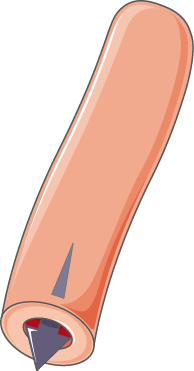Vasoconstriction
(Redirected from Vasoconstrictive)
Vasoconstriction[edit | edit source]
Vasoconstriction is the narrowing of the blood vessels resulting from contraction of the muscular wall of the vessels, particularly the large arteries and small arterioles. This process is the opposite of vasodilation, which is the widening of blood vessels. Vasoconstriction is a crucial mechanism in the regulation of blood pressure and blood flow.
Mechanism[edit | edit source]
Vasoconstriction is primarily mediated by the sympathetic nervous system. When the body needs to increase blood pressure or reduce blood flow to certain areas, the sympathetic nervous system releases norepinephrine, which binds to adrenergic receptors on the smooth muscle cells of the blood vessels, causing them to contract. Other factors that can induce vasoconstriction include hormones such as angiotensin II, vasopressin, and endothelin.
Physiological Role[edit | edit source]
Vasoconstriction plays a vital role in maintaining homeostasis within the body. It helps regulate blood pressure by adjusting the diameter of blood vessels, thus controlling the resistance to blood flow. During cold exposure, vasoconstriction reduces blood flow to the skin to minimize heat loss. In situations of blood loss or dehydration, vasoconstriction helps maintain blood pressure by reducing the volume of the circulatory system.
Pathological Conditions[edit | edit source]
Excessive or prolonged vasoconstriction can lead to hypertension (high blood pressure) and contribute to cardiovascular disease. Conditions such as Raynaud's phenomenon involve abnormal vasoconstriction, leading to reduced blood flow to extremities and causing symptoms like cold fingers and toes.
Pharmacological Agents[edit | edit source]
Several drugs can induce vasoconstriction, including decongestants like pseudoephedrine and phenylephrine, which are used to relieve nasal congestion by reducing blood flow to the nasal passages. Conversely, vasodilators are used to treat conditions like hypertension by relaxing blood vessels and reducing resistance to blood flow.
Related Pages[edit | edit source]
References[edit | edit source]
- Guyton, A. C., & Hall, J. E. (2006). Textbook of Medical Physiology. Elsevier Saunders.
- Hall, J. E. (2011). Guyton and Hall Textbook of Medical Physiology. Elsevier Health Sciences.
| Physiology of the cardiovascular system | ||||||||||||||
|---|---|---|---|---|---|---|---|---|---|---|---|---|---|---|
|
Search WikiMD
Ad.Tired of being Overweight? Try W8MD's NYC physician weight loss.
Semaglutide (Ozempic / Wegovy and Tirzepatide (Mounjaro / Zepbound) available. Call 718 946 5500.
Advertise on WikiMD
|
WikiMD's Wellness Encyclopedia |
| Let Food Be Thy Medicine Medicine Thy Food - Hippocrates |
Translate this page: - East Asian
中文,
日本,
한국어,
South Asian
हिन्दी,
தமிழ்,
తెలుగు,
Urdu,
ಕನ್ನಡ,
Southeast Asian
Indonesian,
Vietnamese,
Thai,
မြန်မာဘာသာ,
বাংলা
European
español,
Deutsch,
français,
Greek,
português do Brasil,
polski,
română,
русский,
Nederlands,
norsk,
svenska,
suomi,
Italian
Middle Eastern & African
عربى,
Turkish,
Persian,
Hebrew,
Afrikaans,
isiZulu,
Kiswahili,
Other
Bulgarian,
Hungarian,
Czech,
Swedish,
മലയാളം,
मराठी,
ਪੰਜਾਬੀ,
ગુજરાતી,
Portuguese,
Ukrainian
Medical Disclaimer: WikiMD is not a substitute for professional medical advice. The information on WikiMD is provided as an information resource only, may be incorrect, outdated or misleading, and is not to be used or relied on for any diagnostic or treatment purposes. Please consult your health care provider before making any healthcare decisions or for guidance about a specific medical condition. WikiMD expressly disclaims responsibility, and shall have no liability, for any damages, loss, injury, or liability whatsoever suffered as a result of your reliance on the information contained in this site. By visiting this site you agree to the foregoing terms and conditions, which may from time to time be changed or supplemented by WikiMD. If you do not agree to the foregoing terms and conditions, you should not enter or use this site. See full disclaimer.
Credits:Most images are courtesy of Wikimedia commons, and templates, categories Wikipedia, licensed under CC BY SA or similar.
Contributors: Prab R. Tumpati, MD






